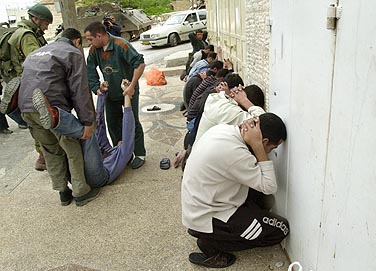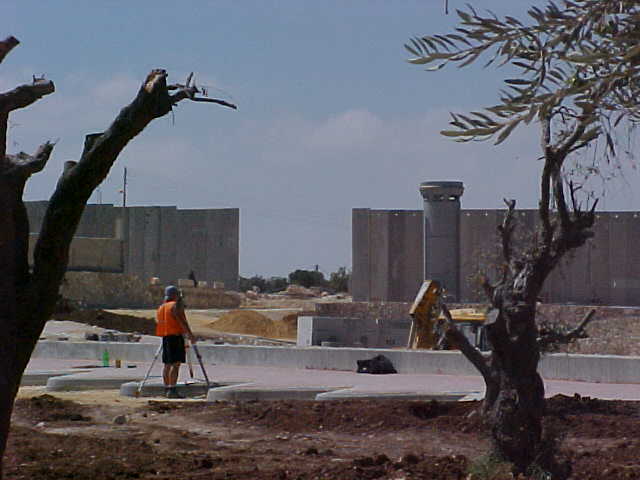Bear with me on this one. We are in the Galilee, staying in an adorable inn with dozens of cottages and private sea access. Everyone here, save my group, is Jewish. (Excepting, of course, the Palestinians cleaning the place who only deserve parenthetical reference.) Everyone went swimming, and I felt bad being anti-social, so I sat on the beach as they swam and sunbathed. I wanted to cry. Not just because we are in ’48 and looking at the occupied Golan Heights and chucking thousands into the Israeli economic (read war) machine, but because everyone I love in Palestine can’t get a military permit to come and sit with me on the beach that I’m enjoying with my white skin and blue passport. So, I decide to assert a very small act of solidarity with my friends and family on the other side of the Green Line: I dawn my keffiyah. You know that black and white checkered scarf that Palestinian men wear on their heads and women around their shoulders.
I go into the inn’s restaurant. People make friendly comments, and I don’t notice any dirty looks. My group arrives and joins me at the table, and the leader tells me I shouldn’t wear that here. She doesn’t mean Israel, but rather this posh resort that is basically exclusively Jewish. I tell her I don’t think it is a problem since I don’t notice people responding to me with any tension, but, I assure her, if she really wants me to take it off, I will. Not at all because I think she is right, but because it’s not worth the fight that it will provoke with her. She says she’ll get some feedback from another group member and let me know. In the meantime, I sit back down to eat.
Next to me is Khalid, our bus driver who I’ve invited to join us at the table. He asks me if I like the chicken, and I say: “Ana la akl lahama” (I don’t eat meat).
“Ah, vegetarian,” he says, “Very good. You like moulaheeya?” I tell him I love it, and he says it’s very hard to make. Who cooks this for me, he asks. My mother, I say.
“Your mother?! Wait, she is Palestinian?” he asks in confusion. And I tell him that nearly five years ago a Palestinian family took me into their home. He asks where they are from and I say her village name. He gets serious and asks if I came through the Jordan border crossing before one year. He remembers me and recollects that the Israelis kept me there most of the day. And also he remembers that they asked my grandfathers’ names, both on my mother’s and father’s sides. I was so pissed off because I didn’t know their full names and found the question absurd. I was the last person out of the border area, and I tried to haggle down the fixed price! He remembers all this and tells me. I'm so shocked. I can’t believe he remembers me, especially when I think about it and realize it was nearly three years ago that I made this trip.
Khalid leans in to advise me: “It’s not my business, but you should wear this keffiyah only in the Palestinian area. Here it’s not good.” I know what he is saying. I’m starting to notice some stares, and I know. I get it. And he knows why I’m wearing it. For god’s sake, he’s Palestinian. I say, “I get it, but they took the land, they took the water, they took everything. They can’t take you. They have to see that you are here.” And he said, “We will not disappear. This is from God, that we are still here.” The Palestinian has to tell me to lay low. He passes on the lesson he has learned: no Arabs should be seen here. I look around at all the men wearing their skull caps and think really hard: Why is that okay, but I make them uncomfortable? And then I remember, it’s not me. My white skin and American accent make me very, very welcome here. But my solidarity…with the others, that is intolerable. At least keep it to myself. So, I leave the table and come back here to write this story, hoping it will make me feel a little less sad. But I can’t, because it is so fucked up. Out of sight, out of mind. These are human beings and they are erasing them from their reality.
Thursday, July 24, 2008
Subscribe to:
Post Comments (Atom)








2 comments:
I'm having a really hard time putting this in words, but I just want to say you did such a noble thing that day...you stood up for many. God sees, God knows all the hardship and frustration you feel--I hope you'll find peace and calmness in that..
I don't know your religion, but I do know that you stand with the people that have and are struggling through terrible strife...I feel for all Palestinians not only because I am a Muslim, but because you and all your people represent our reason for being. I found this in search for some material for a varsity presentation, and I cann't say how this simple passage has showed me that how Palestinian people are standing up to this inhumane cruelty and it gives me unexplainable hope for in the end all of us stand equal and answerable to God. May you find deliverance and absolution in your quest for freedom and life, and know that you do not stand alone.
Post a Comment